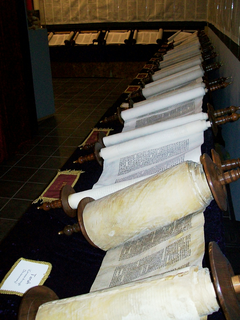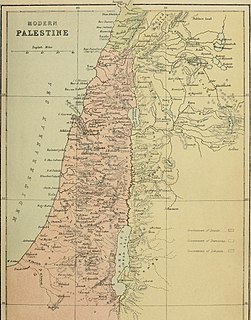See also
| This disambiguation page lists articles associated with the title Commentaries on the Bible. If an internal link led you here, you may wish to change the link to point directly to the intended article. |
Commentaries on the Bible may refer to:
Jewish commentaries on the Bible are biblical commentaries of the Hebrew Bible from a Jewish perspective. Translations into Aramaic and English, and some universally accepted Jewish commentaries with notes on their method of approach and modern translations into English with notes are listed.
| This disambiguation page lists articles associated with the title Commentaries on the Bible. If an internal link led you here, you may wish to change the link to point directly to the intended article. |

The Book of Amos is the third of the Twelve Minor Prophets in the Tanakh/Old Testament and the second in the Greek Septuagint tradition. Amos, an older contemporary of Hosea and Isaiah, was active c. 750 BC during the reign of Jeroboam II, making Amos the first book of the Bible to be written. Amos lived in the kingdom of Judah but preached in the northern kingdom of Israel. His major themes of social justice, God's omnipotence, and divine judgment became staples of prophecy.

In the Christian Bible, the two Books of Chronicles generally follow the two Books of Kings and precede Ezra–Nehemiah, thus concluding the history-oriented books of the Old Testament.

The Book of Joel is part of the Hebrew Bible, one of twelve prophetic books known as the Twelve Minor Prophets.

The Book of Habakkuk is the eighth book of the 12 minor prophets of the Bible. It is attributed to the prophet Habakkuk, and was probably composed in the late 7th century BC.

The Book of Exodus or Exodus is the second book of the Torah and the Hebrew Bible immediately following Genesis.

The Book of Genesis is the first book of the Hebrew Bible and the Old Testament. It is divisible into two parts, the Primeval history and the Ancestral history. The primeval history sets out the author's concepts of the nature of the deity and of humankind's relationship with its maker: God creates a world which is good and fit for mankind, but when man corrupts it with sin God decides to destroy his creation, saving only the righteous Noah to reestablish the relationship between man and God. The Ancestral History tells of the prehistory of Israel, God's chosen people. At God's command Noah's descendant Abraham journeys from his home into the God-given land of Canaan, where he dwells as a sojourner, as does his son Isaac and his grandson Jacob. Jacob's name is changed to Israel, and through the agency of his son Joseph, the children of Israel descend into Egypt, 70 people in all with their households, and God promises them a future of greatness. Genesis ends with Israel in Egypt, ready for the coming of Moses and the Exodus. The narrative is punctuated by a series of covenants with God, successively narrowing in scope from all mankind to a special relationship with one people alone.

The Old Testament is the first part of Christian Bibles, based primarily upon the Hebrew Bible, a collection of ancient religious writings by the Israelites believed by most Christians and religious Jews to be the sacred Word of God. The second part of the Christian Bible is the New Testament.

The Hebrew Bible, also called the Tanakh or Mikra, is the canonical collection of Jewish texts, which is also the textual source for the Christian Old Testament. These texts are composed mainly in Biblical Hebrew, with some passages in Biblical Aramaic. The form of this text that is authoritative for Rabbinic Judaism is known as the Masoretic Text (MT), and is divided into 24 books, while the Protestant Bible translations divide the same material into 39 books.

The Minor Prophets or Twelve Prophets, occasionally Book of the Twelve, is the last book of the Nevi'im, the second main division of the Jewish Tanakh. The collection is broken up to form twelve individual books in the Christian Old Testament, one for each of the prophets. The terms "minor prophets" and "twelve prophets" can also refer to the twelve traditional authors of these works.

The four tables give the most commonly accepted dates or ranges of dates for the Old Testament/Hebrew Bible, the Deuterocanonical books and the New Testament, including, where possible, hypotheses about their formation-history.

Exegesis is a critical explanation or interpretation of a text, particularly a religious text. Traditionally the term was used primarily for work with the Bible; however, in modern usage "biblical exegesis" is used for greater specificity to distinguish it from any other broader critical text explanation.

Delilah is a woman mentioned in the sixteenth chapter of the Book of Judges in the Hebrew Bible. She is loved by Samson, a Nazirite who possesses great strength and serves as the final Judge of Israel. Delilah is bribed by the lords of the Philistines to discover the source of his strength. After three failed attempts at doing so, she finally goads Samson into telling her that his vigor is derived from his hair. As he sleeps, Delilah orders a servant to cut Samson's hair, thereby enabling her to turn him over to the Philistines.
The Christian Community Bible is a translation of the Christian Bible in the English language originally produced in the Philippines.

Jewish English Bible translations are English translations of the Hebrew Bible (Tanakh) according to the Masoretic Text, in the traditional division and order of Torah, Nevi'im, and Ketuvim. Most Jewish translations appear in bilingual editions (Hebrew–English).

Matthew 19 is the nineteenth chapter in the Gospel of Matthew in the New Testament section of the Christian Bible. The book containing this chapter is anonymous, but early Christian tradition uniformly affirmed that Matthew composed this Gospel. Jesus continues his final journey to Jerusalem ministering through Perea. The narrative can be divided into the following subsections:
The Logos International Study Bible is a study Bible published in 1972 by Logos International, and edited by Bible scholar Harold E. Monser (1868-1918).

Table I gives an overview of the periods and dates ascribed to the various books of the Bible. Tables II, III and IV outline the conclusions of the majority of contemporary scholars on the composition of the Hebrew Bible, the deuterocanonical works, and the New Testament.

Psalm 128 is the 128th psalm of the Book of Psalms in the Old Testament. It is one of fifteen psalms which begins with the words "A song of ascents". It contains only six verses, and discusses the blessed state of those who follow Yahweh. Its opening words in the King James Version are "Blessed is every one that feareth the LORD; that walketh in his ways". In the Greek Septuagint version of the bible, and in its Latin translation in the Vulgate, this psalm is Psalm 127 in a slightly different numbering system.

The Jamieson-Fausset-Brown Bible Commentary refers to a biblical commentary entitled a Commentary Critical and Explanatory on the Whole Bible, prepared by Robert Jamieson, Andrew Robert Fausset and David Brown and published in 1871; and derived works from this initial publication, in differing numbers of volumes and abridgements. The commentary uses the King James Version of the Bible as its text.